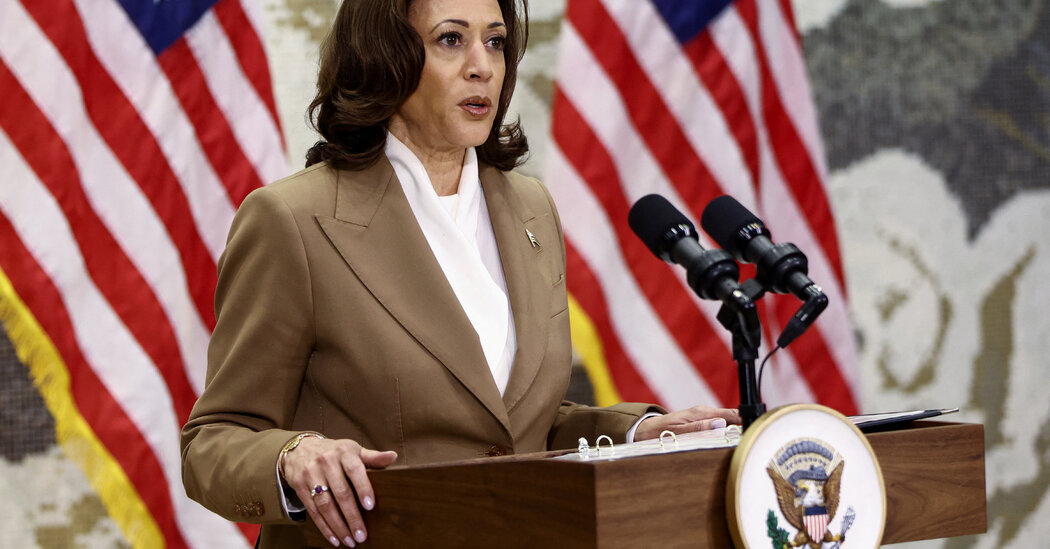Vice President Kamala Harris said on Saturday that the United States fiercely opposes forcibly relocating Gaza residents outside the enclave as Israel resumes its bombardment of Hamas terrorists, or in the days and weeks after the war eventually ends.
In a statement after meeting with President Abdel Fattah el-Sisi of Egypt in Dubai, officials said Ms. Harris rejected the idea of moving Palestinians into Egypt or refugee camps elsewhere and offered her strongest statement to date urging Israel to reduce harm to civilians in its war campaign.
“The vice president reiterated that under no circumstances will the United States permit the forced relocation of Palestinians from Gaza or the West Bank,” the statement from the White House said.
She also rejected an idea suggested recently by some Israeli officials that the borders of Gaza could shrink after the war is over to accommodate a security “buffer zone” between the interior of Gaza and Israel. The statement said the United States would not permit “the redrawing of the borders of Gaza.”
Ms. Harris delivered the stern comments after a daylong diplomatic blitz with the leaders of four Arab countries in Dubai, where she was attending the United Nations global climate summit known as COP28. Her trip had been announced as climate-related, but she spent far more time meeting and talking with the Arab leaders about the Israel-Hamas war.
After flying nearly 15 hours from Washington, Ms. Harris met with Mr. el-Sisi, King Abdullah of Jordan and President Mohammed bin Zayed of the United Arab Emirates. She also spoke in a lengthy call with Sheikh Tamim bin Hamad al-Thani, the emir of Qatar.
White House officials said that the vice president did not plan to travel on to Israel, and that she would return to the United States on Sunday. The officials said Ms. Harris had participated in several meetings with top Israeli politicians over the past eight weeks.
In a brief news conference in Dubai, Ms. Harris said her conversations had focused on what Israel and Hamas — and the rest of the countries in the Middle East — would need to do once the war is over.
“When this conflict ends, Hamas cannot control Gaza and Israel must be secure,” she said. “Palestinians need a hopeful political horizon, economic opportunity and freedom. And the region more broadly must be integrated and prosperous. And we must work toward that.”
The vice president declined to say whether she had secured specific commitments from the four Arab leaders to help in a postwar period. She said other countries would have to help with “reconstruction, security and governance,” but spoke only in generalities about what Jordan, Egypt, the Emirates or Qatar might do to rebuild Gaza or help ensure security and stability.
Ms. Harris also declined to say whether she believed that Israel was acting in accordance with American demands to more precisely target its military strikes and to minimize civilian casualties. The Gazan health ministry said in a statement on Saturday afternoon that 193 people had been killed in the “past hours.”
“I don’t have the details to tell you exactly who was killed,” she told reporters Saturday night. “But I will say that we have been very clear about where we stand on this, which is innocent civilian lives should not be intentionally targeted, and that Israel must do more to protect innocent life.”
A senior Biden administration official said the president’s team believed that the Israeli government and military were taking steps to be more precise in their strikes as the fighting has resumed. But the official, who spoke on the condition of anonymity to discuss sensitive diplomatic conversations, declined to comment on an Israeli strike in Khan Younis this weekend that killed civilians.
The vice president’s admonition that Gaza’s borders should not be altered came after Israeli officials suggested the idea. “The territory of Gaza will be smaller at the end of the war,” Foreign Minister Eli Cohen told Israel’s right-leaning Channel 14 in mid-October.
Asked about a potential buffer zone in Gaza, Mark Regev, a senior adviser to Mr. Netanyahu, said in a Saturday media briefing that Israel was seeking a “security envelope” in the enclave.
“In a post-Hamas reality, Israel will maintain for the foreseeable future overall security control. That will be a necessary prerequisite,” Mr. Regev told reporters. “You won’t have a situation in the future when you can have Hamas terrorists directly on the border.”
“This is not Israel taking territory from Gaza,” Mr. Regev added. “On the country, that is creating security zones, where you have a special situation on the ground which limits the ability of people to enter Israel to kill our people.”
Asked specifically about a buffer zone in Gaza, Ms. Harris told reporters that the United States had not “weighed in on that.”
But her earlier statement about refusing to accept any changes in the borders of Gaza appeared to rule out such an idea.


